Artificial intelligence can transform and enhance sales processes from lead generation to sales forecasting, helping businesses overcome low conversion rates and long sales cycles.
Check out AI in sales use cases structured around key sales activities to show how sales AI tools can accelerate the sales cycle and enhance sales effectiveness:
How can AI support sales?
While AI is not yet mature enough to fully manage the complex conversations and relationship-building essential in sales, its role today is to enhance, not replace, sales professionals.
AI automates time-consuming tasks such as data entry, meeting scheduling, and even more complex jobs including sales forecasting while freeing your sales team to focus on building relationships and closing deals.
AI tools can help sales reps prioritize leads and spot customer behavior patterns, also improving performance and boosting conversions.
For sales managers, AI systems can provide detailed analytics on sales calls, emails, and chats, and insights into customer interactions to improve the overall sales process.
Though we have become highly familiar with AI applications, prioritizing the right ones is crucial for success. Process mining, for example, allows sales teams to analyze data from CRM and other platforms while optimizing workflows and enabling better decision-making in customer relationships.
AI in sales use cases with real life examples
Forecast sales with higher accuracy
Demand forecasting
Sales forecasting is crucial in the sales process but can be complex for new businesses. With AI in sales tools, these forecasts can become more accurate and automated.
By leveraging customer data from CRM systems and previous sales outcomes, AI tools can support your sales reps to focus on revenue-generating activities while improving sales forecasting accuracy. To learn more, check out AI-powered demand forecasting.
After improving forecasting accuracy, the next step is ensuring your sales reps focus on the right leads at the right time. AI-driven lead prioritization tools analyze vast amounts of customer data, ensuring your team can focus on the most promising prospects and close deals faster.
Real-life example:
Forecastio’s AI-based sales forecasting platform uses machine learning models to analyze large datasets and identify patterns for highly accurate sales predictions. It incorporates time series analysis to consider trends, seasonality, and market fluctuations.
By automating deal probability calculations based on historical performance, Forecastio eliminates guesswork and provides real-time insights to align sales goals with projected outcomes. The platform helps businesses achieve up to 95% forecasting accuracy to improve decision-making and strategic planning.1
Lead generation
AI for sales can also automate lead generation by producing insights from customer behavior, and helping sales teams identify qualified leads quickly.
AI Avatars
AI avatars can transform customer interactions in digital spaces by using generative AI and machine learning to simulate human-like behavior. As these avatars learn and improve, they can drive sales conversations and optimize pricing, ultimately increasing sales effectiveness.
AI avatars can enhance sales processes by providing personalized and scalable customer interactions with:
- Personalized customer engagement: AI avatars can interact with customers in a personalized manner by using data from CRM systems, past interactions, and customer behavior. They can engage website visitors, answer product-related questions, and offer personalized recommendations.
- 24/7 availability: AI avatars can operate continuously without needing breaks. This helps sales teams capture and nurture leads even outside of traditional business hours, while accelerating sales and improving customer success rates.
- Sales conversations: AI avatars can handle repetitive tasks such as answering FAQs or scheduling meetings.
- Sales pitches and product demos: AI avatars can be designed to deliver interactive sales pitches or product demonstrations to offer a consistent and engaging customer experience. They can adapt their communication based on customer feedback to ensure that each conversation aligns with the customer’s needs and preferences.
To learn more about how avatars and videos can help sales processes, check out AI Avatar generation.
Real-life example:
DaveAI is an AI-powered sales support platform that helps businesses create personalized product discovery experiences. It offers virtual sales avatars that assist with real-time customer interactions, 3D product visualizations, and adaptive recommendations.
DaveAI uses conversational AI, natural language processing, and machine learning to enhance sales processes by providing actionable insights, increasing lead qualification, and improving conversion rates. DaveAI solutions are integrable with enterprise systems, and used across industries like automotive, retail, and banking to drive customer engagement and sales growth.2
AI SDR agents
AI SDR (Sales Development Representative) agents use artificial intelligence to automate and streamline the early stages of the sales process.
They can handle lead generation, outreach, and qualification by engaging prospects through emails, chat, or voice interactions.
AI SDRs can analyze customer data and behaviors to personalize outreach, nurturing leads until they are ready for a sales rep. These agents can also save time by automating repetitive tasks like scheduling meetings or answering FAQs.
Real-life example:
Artisan AI’s AI SDR agent, Ava, partners with leading data providers to access accurate B2B data through AI-powered automation.
Integrated into the AI sales platform, Ava handles email outreach by impersonating sales team members by using generative AI to ensure consistent, on-brand messaging.
Ava also drafts responses and automates follow-ups to streamline sales activities. Soon, Ava will extend her capabilities to automate LinkedIn and social media outreach through sending connection requests and messages to enhance conversions and further optimize the sales cycle.
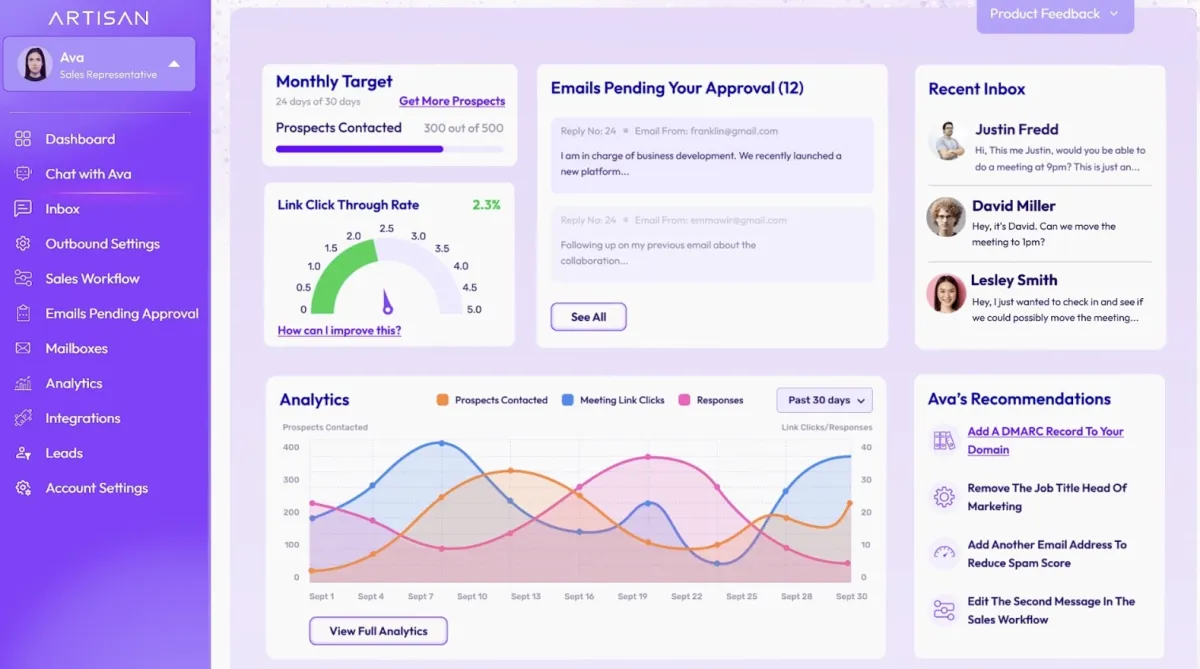
Figure 1: Artisan’s Ava sales dashboard.3
Help your sales reps prioritize leads
Lead prioritization
Instead of relying solely on experience, AI in sales tools can analyze data from hundreds of sales professionals to prioritize leads effectively. These AI-powered insights can help your sales team focus on prospects more likely to convert, therefore improving sales performance and accelerating the sales cycle.
Website traffic analysis for lead prioritization
AI systems can analyze website visitors’ behavior and provide real-time data on how customers interact with your site.
Website identification tools can help businesses manage the prioritization of leads using how potential customers interact with your company’s digital properties.
These tools can also send automatic “trigger reports” to your sales reps when a potential high-quality lead is identified, therefore, allowing your sales team to follow up at key moments.
Deliver personalized sales content and next-step suggestions
Sales content personalization and analytics
Sales reps can engage leads more effectively by leveraging personalized content, tailored to customer behavior and preferences. With AI tools, sales platforms can pull insights from customer interactions and ensure that the right content reaches the right audience at the right time. Personalized content helps improving sales conversations, customer relationships, and increases sales.
Next best action suggestions
AI-powered sales software leverages data from various sources like sales calls, emails, CRM data, and customer interactions to recommend personalized next steps for sales reps.
These suggestions might include reaching out to a lead with a specific offer, scheduling a follow-up meeting, or sending a tailored email based on the customer’s past behavior or preferences. AI identifies patterns in the sales process and helps reps prioritize high-impact actions that can accelerate deals and enhance customer relationships.
This approach improves sales efficiency by automating parts of the decision-making process and minimizing missed opportunities.
Real-life example:
Copy.ai generates detailed competitor analysis reports, persona insights, and battle cards to eliminate manual work and speeding up content creation processes.
This AI-powered tool helps sales teams create targeted, compelling and personalized content, and accelerate deals with minimal effort.
The platform also produces on-brand FAQ documents based on customer queries to prepare sales reps to handle objections and build trust.4
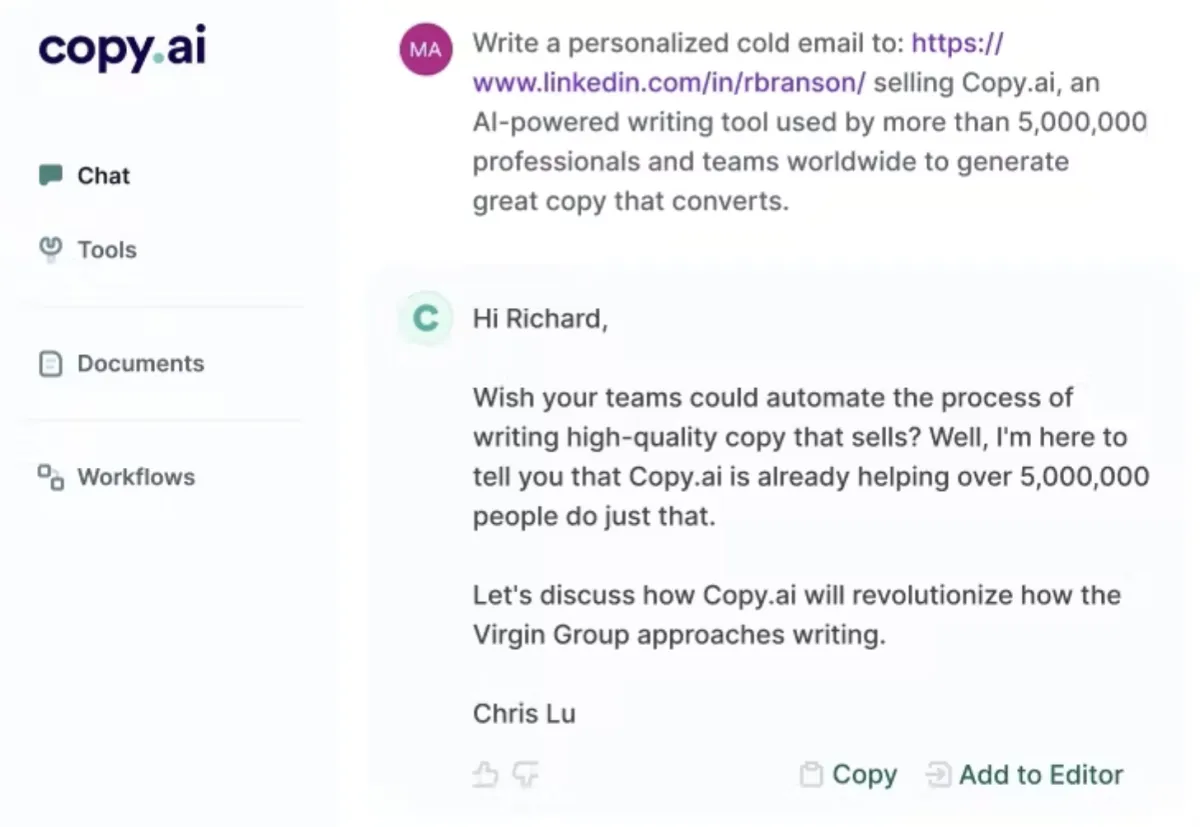
Figure 2: Copy.ai personalized cold email generation.5
Automate sales tasks
Meeting setup automation
AI tools integrated into sales software can automatically schedule meetings. This allows sales professionals to eliminate repetitive tasks like back-and-forth email exchanges to enable them to focus on higher-impact sales activities.
AI systems can interpret sales conversations and pull insights from customer interactions to generate automatic meeting requests that align with both the sales representative’s schedule and the prospect’s availability.
These AI-powered tools can be particularly valuable for sales managers and sales reps, who often manage multiple deals and need a more efficient way to manage their schedules. Sales automation ensures that the right meetings are set at the right time.
Sales data input automation
Sales automation tools can automatically sync customer data from various channels into your CRM including:
- Call transcripts
- Email updates
- Social media interactions
This intelligent automation reduces the manual workload for sales reps, while giving them more time for critical sales activities like building relationships and closing deals.
Sales rep response suggestions
Leveraging natural language processing, AI tools can analyze sales conversations and suggest appropriate responses during live interactions. This process supports the effectiveness of sales reps during customer interactions and keeps the sales process moving forward efficiently.
Real-life example:
Calendly has introduced new AI-powered features designed to enhance scheduling efficiency. One of the key updates, which is currently in beta, is Calendly Assist. Calendly Assist will allow users to schedule one-off meetings through a conversational AI interface.
This feature is expected to provide suggestions based on user preferences, such as meeting type, date, and duration, and integrates these options into a streamlined scheduling process. It will also adjust availability automatically and generate a scheduling link that can be shared via email or messaging platforms.6
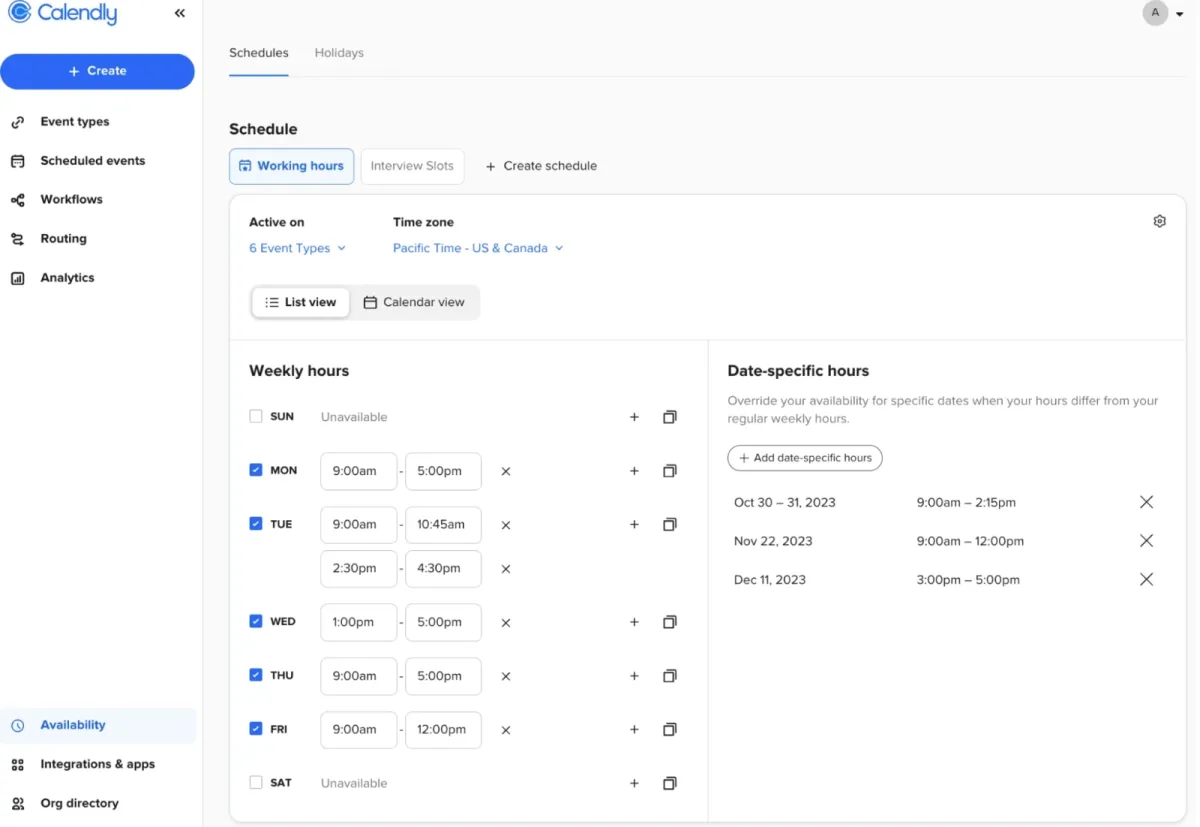
Figure 3: Calendly event scheduling dashboard.7
Sales enablement with sales assistants
Chat and email bots for sales rep
AI-powered chatbots enhance sales by supporting lead generation, automating customer interactions, and enabling 24/7 support.
They capture prospect information, direct leads to demos or appointments, and manage tasks like cart recovery and upselling. Chatbots can also build detailed customer profiles through analytics to help businesses optimize and track key sales channels.
Additionally, they assist in lead qualification by prioritizing high-value interactions while ensuring that sales reps focus on the most promising prospects, ultimately improving efficiency and driving revenue growth.
Real-life example:
Zendesk’s Answer Bot is an AI-powered tool that helps businesses provide instant customer support by answering common queries through chat.
It uses machine learning to analyze customer questions and delivers relevant articles or solutions from the company’s knowledge base. This reduces the need for human agents to handle repetitive inquiries.
The bot also integrates with multiple channels, such as websites, emails, and messaging platforms, to enable an effective customer experience across different channels.8
In-store sales robots
In-store robots can interact with customers, answer questions, provide product recommendations, and guide them through the store. This helps to accelerate sales by offering personalized service without requiring the constant presence of sales reps.
These robots can also collect and analyze customer data in real-time to provide tailored suggestions, thereby improving the chances of converting a potential lead into a buyer.
As part of a broader sales strategy, in-store sales robots can also handle repetitive tasks, such as managing inventory inquiries or setting realistic expectations for delivery and product availability.
AI systems behind these robots often use machine learning to continuously improve their ability to engage with customers and provide relevant product recommendations based on customer behavior, preferences, and sales conversations. By integrating revenue intelligence and analyzing data from customer interactions, these AI tools can help retailers optimize pricing, predict sales trends, and improve overall sales effectiveness.
Sales managers and sales leaders can utilize in-store robots as part of their broader sales automation efforts. By integrating AI-powered robots into the sales funnel, businesses can enhance customer success, improve customer relationships, and increase sales, while also reducing the workload on human sales reps.
Real-life example:
LoweBot is an in-store service robot developed by Lowe’s, a major home improvement retailer. Its primary function is to assist customers in-store by providing information and guidance.
LoweBot supports the in-store shopping experience by assisting customers with product availability, store layout, and item locations using natural language processing.
It also provides real-time product information by scanning inventory data, reducing the time customers spend searching for items.
Leveraging mapping technology, LoweBot can guide shoppers directly to the products they need. Additionally, it collects data on customer interactions and behaviors to optimize store layouts and improve sales strategies. With multilingual support, LoweBot allows accessibility for a diverse range of customers.
Improve sales analytics
Customer sales contact analytics
By analyzing data from every customer contact, AI tools can produce actionable insights that sales teams can use to improve productivity.
Sales leaders can share these insights across the sales teams to enhance sales effectiveness and boost overall performance.
Layout optimization in retail
In B2C retail, AI applications like layout optimization can help businesses enhance the in-store or website experience by analyzing customer behavior data.
AI tools can provide insights on how to structure store layouts or webpage designs to increase customer engagement and drive more sales. This can accelerate sales by improving the customer journey and creating a more effective sales funnel.
Price optimization
AI-powered pricing tools leverages machine learning to scrape competitor data and recommend optimal pricing strategies based on customer behavior and competitor pricing trends.
These dynamic pricing systems help sales teams optimize pricing and also tailor pricing recommendations to individual customers to improve both sales conversion and customer satisfaction.
Real-life example:
Accenture’s Solutions.AI for Pricing helps businesses optimize pricing strategies. It provides real-time insights based on market trends, competitor data, and customer behavior to enable personalized and dynamic pricing.
The tool also supports price simulations, revenue growth management, and margin optimization. By automating pricing processes, businesses can increase profitability, reduce promotional costs, and enhance customer satisfaction across various industries, including retail, automotive, and communications.9
Sales attribution
With AI in sales, big data can be leveraged to accurately attribute sales to specific marketing campaigns and sales activities. This provides sales managers with detailed insights into the effectiveness of their sales strategies, to optimize the sales process and improve sales performance.
Real-life example:
Salesforce’s Sales Analytics tool helps businesses gain insights into their sales performance through real-time data analysis, while improving forecasting accuracy and pipeline management.
It offers customizable dashboards, visualizations, predictive insights and supports pipeline inspection, revenue forecasting, and lead prioritization.
Salesforce’s Sales Analytics tool allows sales managers to track performance, adjust strategies, and close deals faster. Integrated with Salesforce’s CRM and powered by Einstein AI, it enhances sales effectiveness across the entire sales cycle.10
External Links
- 1. Alternative HubSpot Sales Forecasting to Achieve 95% Accuracy.
- 2. Reimagining Virtual Sales with AI-Powered Sales Experience Platforms | DaveAI. DaveAI
- 3. Hire Ava, the AI SDR | the Best AI Sales Agent.
- 4. Sales Content Creation - Use Cases - GTM AI Platform.
- 5. Elevating AI Productivity: How Copy.ai Simplifies Data Uploads with OneSchema.
- 6. Meeting Recaps overview – Help Center.
- 7. Meet the refreshed Calendly — it’s easier than ever to navigate, schedule meetings, and update your availability | Calendly.
- 8. Sales Chatbot Guide: The 6 Best AI Chatbots for Sales in 2025.
- 9. Artificial Intelligence (AI) Services & Solutions | Accenture.
- 10. Best Sales Analytics Software & Tools | Sales Cloud | Salesforce EMEA.
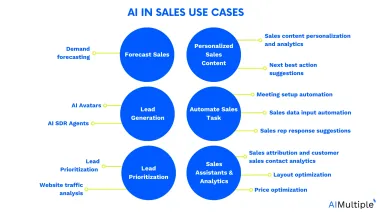
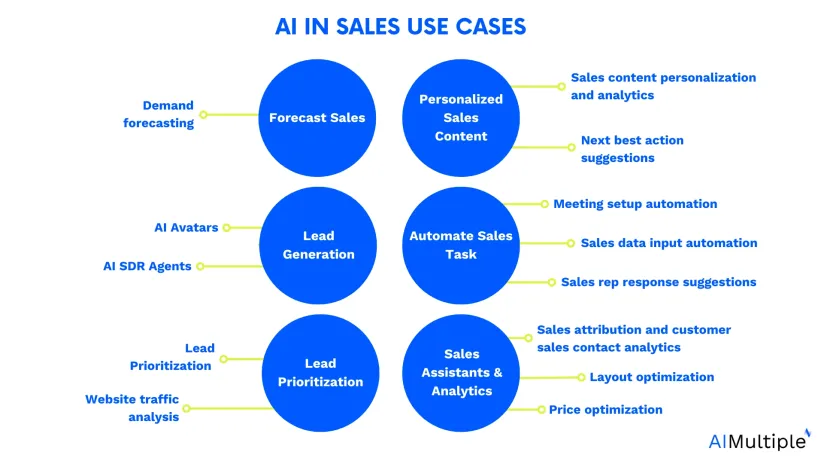



Comments
Your email address will not be published. All fields are required.